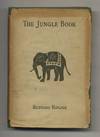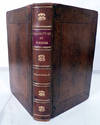![Jin yuan ji shi shi 金源紀事詩 [Poems Commemorating Events during the Course of Jin History]](https://d3525k1ryd2155.cloudfront.net/h/955/873/1457873955.0.m.jpg)
Jin yuan ji shi shi 金源紀事詩 [Poems Commemorating Events during the Course of Jin History]
by TANG, Yuntai 湯運泰
- Used
- Condition
- See description
- Seller
-
New York, New York, United States
Payment Methods Accepted
About This Item
80; 64; 62; 73 folding leaves. Eight juan in four vols. 8vo, orig. brown wrappers, title in manuscript on upper cover of each vol., orig. stitching. Yangzhou: Huinan shu ju, 1873.
Second edition (1st ed.: 1813). Upon reading History of the Jin, compiled in 1345 under the leadership of the Mongol scholar-official Toγtaγa (1314-56), Tang began in 1804 to narrate the events from the history of that state in verse form. He decided to have a selection of the poems printed in 1813, toward the end of his life. They were reprinted in 1873 in the present work.
The poems were annotated by Tang's sons Xianye and Xian'gan and proofread by several dozens of Tang's former students. Tang Yuntai was from Qingpu, which is today within the Shanghai city limits. In addition to this book of poetry, he authored a work of annotations to the 12th century history, Book of the Southern Tang.
The Jin empire was established in 1115. Centered in northern China and Manchuria, it drove the Chinese Song dynasty south of the Yangzi river and vied with the Song for the position of the dominant power in East Asia for about a century, until the Mongols defeated the Jin in 1234 (and the Song a few decades later). The Jin were ruled by Jurchens, who had previously lived in Manchuria under Khitan domination. The Manchus, who conquered China and established the Qing empire, under which Tang Yuntai was living, were descendants of Jurchens. The link between the Jurchens and the Manchus was known and celebrated by the Qing court, and there was substantial scholarly interest in the history of the Jin empire in the Qing period.
Tang Yuntai's poetry collection is a product of this scholarly interest. He did not limit himself to Toγtaγa's History of the Jin, but used a number of historical sources in the writing of these poems. The annotations appended to them by his sons similarly draw on a number of sources, including the 18th-century scholar Qian Daxin's study of the dynastic histories. The poems are arranged chronologically, by reign.
Fine set, preserved in a hantao.
Second edition (1st ed.: 1813). Upon reading History of the Jin, compiled in 1345 under the leadership of the Mongol scholar-official Toγtaγa (1314-56), Tang began in 1804 to narrate the events from the history of that state in verse form. He decided to have a selection of the poems printed in 1813, toward the end of his life. They were reprinted in 1873 in the present work.
The poems were annotated by Tang's sons Xianye and Xian'gan and proofread by several dozens of Tang's former students. Tang Yuntai was from Qingpu, which is today within the Shanghai city limits. In addition to this book of poetry, he authored a work of annotations to the 12th century history, Book of the Southern Tang.
The Jin empire was established in 1115. Centered in northern China and Manchuria, it drove the Chinese Song dynasty south of the Yangzi river and vied with the Song for the position of the dominant power in East Asia for about a century, until the Mongols defeated the Jin in 1234 (and the Song a few decades later). The Jin were ruled by Jurchens, who had previously lived in Manchuria under Khitan domination. The Manchus, who conquered China and established the Qing empire, under which Tang Yuntai was living, were descendants of Jurchens. The link between the Jurchens and the Manchus was known and celebrated by the Qing court, and there was substantial scholarly interest in the history of the Jin empire in the Qing period.
Tang Yuntai's poetry collection is a product of this scholarly interest. He did not limit himself to Toγtaγa's History of the Jin, but used a number of historical sources in the writing of these poems. The annotations appended to them by his sons similarly draw on a number of sources, including the 18th-century scholar Qian Daxin's study of the dynastic histories. The poems are arranged chronologically, by reign.
Fine set, preserved in a hantao.
Reviews
(Log in or Create an Account first!)
Details
- Bookseller
- Jonathan A. Hill, Bookseller, Inc.
(US)
- Bookseller's Inventory #
- 8121
- Title
- Jin yuan ji shi shi 金源紀事詩 [Poems Commemorating Events during the Course of Jin History]
- Author
- TANG, Yuntai 湯運泰
- Book Condition
- Used
- Quantity Available
- 1
- Keywords
- china, chinese, history, literature
Terms of Sale
Jonathan A. Hill, Bookseller, Inc.
5 day return guarantee, with full refund including shipping costs for up to 5 days after delivery if an item arrives misdescribed or damaged.
About the Seller
Jonathan A. Hill, Bookseller, Inc.
Biblio member since 2009
New York, New York
About Jonathan A. Hill, Bookseller, Inc.
By appointment
Glossary
Some terminology that may be used in this description includes:
- Wrappers
- The paper covering on the outside of a paperback. Also see the entry for pictorial wraps, color illustrated coverings for...
- Fine
- A book in fine condition exhibits no flaws. A fine condition book closely approaches As New condition, but may lack the...
- Leaves
- Very generally, "leaves" refers to the pages of a book, as in the common phrase, "loose-leaf pages." A leaf is a single sheet...

